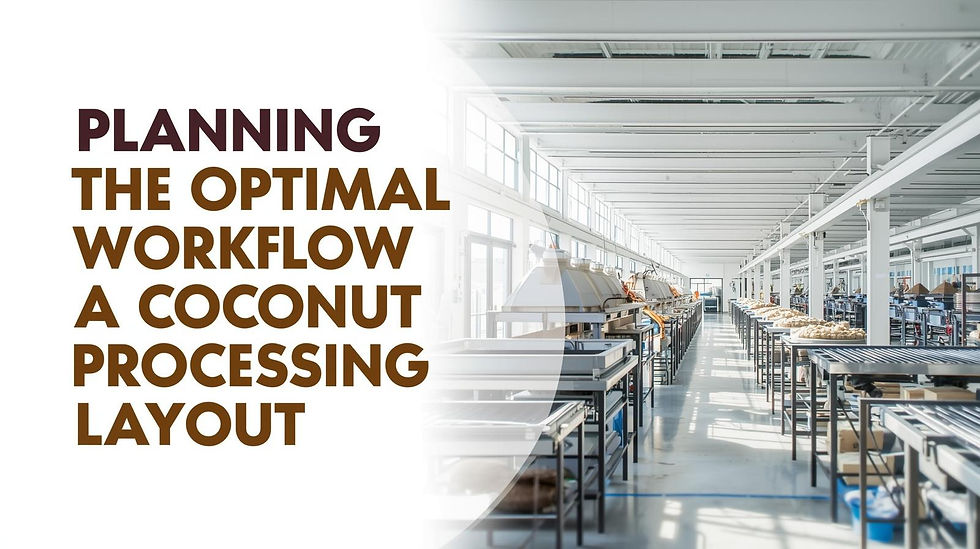Top Features to Look for in Industrial Peeling Machines for 2025
- Feng De
- Aug 13, 2025
- 4 min read

In large-scale food processing, peeling is more than just a preparatory step, it’s a crucial stage that affects product quality, operational efficiency, and profitability. Industrial peeling machines have evolved significantly, and in 2025, they offer advanced capabilities designed to meet the demands of high-volume production, stricter safety regulations, and sustainability goals.
If you’re a food manufacturer, distributor, or processing plant manager, investing in the right peeling machine can reduce labor costs, increase throughput, and maintain consistent quality standards. But not all machines are created equal. In this guide, we’ll explore the top features to look for when selecting an industrial peeling machine in 2025.
1. High-Throughput Capacity
For B2B buyers, the ability to process large quantities quickly is essential. High-throughput capacity allows manufacturers to meet production targets without excessive downtime.
Why it matters: A machine that can process thousands of units per hour ensures consistent supply and reduces production bottlenecks.
What to look for: Capacity ratings in kilograms or tons per hour, adjustable feed rates, and a robust feeding system to avoid jams.
2. Precision Peeling Technology
Over-peeling wastes raw materials, while under-peeling compromises product quality. Modern machines now use precision peeling systems to minimize waste and maintain uniform results.
Why it matters: Reduces raw material waste, improves yield, and enhances visual quality of the end product.
What to look for: Sensor-based peeling systems, adjustable depth settings, and AI-assisted controls for real-time adjustments.
3. Energy Efficiency
With rising energy costs and sustainability pressures, an energy-efficient machine is a smart long-term investment.
Why it matters: Reduces operational costs and helps companies meet environmental targets.
What to look for: Low-power motors, energy recovery systems, and smart shutdown features when idle.
4. Easy Cleaning and Maintenance
Food safety compliance demands regular cleaning, and downtime for maintenance should be minimal.
Why it matters: Keeps machines hygienic, reduces contamination risks, and extends lifespan.
What to look for: Tool-free disassembly, stainless steel construction, and CIP (Clean-In-Place) systems.
5. Multi-Product Versatility
Some processors handle multiple types of produce or ingredients, requiring adaptable peeling solutions.
Why it matters: Maximizes equipment utilization and reduces the need for multiple machines.
What to look for: Adjustable settings for different shapes, sizes, and textures, along with quick-change components.
6. Automated Controls and Smart Technology
Automation is transforming food processing. Machines with intelligent control systems streamline operations and reduce dependency on skilled labor.
Why it matters: Enhances accuracy, improves efficiency, and allows remote monitoring.
What to look for: PLC (Programmable Logic Controller) systems, touchscreen interfaces, IoT connectivity, and data tracking features.
7. Safety Features
Worker safety is a priority in industrial settings. A modern peeling machine should incorporate safety mechanisms to prevent accidents.
Why it matters: Minimizes workplace injuries and ensures compliance with safety regulations.
What to look for: Emergency stop buttons, safety interlocks, and guards over moving parts.
8. Durability and Build Quality
Industrial machines endure constant use, so the choice of materials and construction quality impacts lifespan.
Why it matters: A durable machine reduces replacement costs and ensures consistent performance.
What to look for: Heavy-duty stainless steel frames, corrosion-resistant coatings, and reinforced moving components.
9. Low Noise and Vibration Levels
While often overlooked, noise and vibration levels affect both workplace comfort and machine longevity.
Why it matters: Creates a better work environment and reduces mechanical stress.
What to look for: Machines with vibration-dampening systems and soundproof enclosures.
10. Cost-Effectiveness and ROI
While upfront cost is a factor, long-term ROI is more important for B2B buyers.
Why it matters: A machine that balances efficiency, durability, and operating costs delivers the best value.
What to look for: Competitive pricing, low operating expenses, and minimal consumable part replacements.
Comparison Table: Key Features for 2025 Peeling Machines
Feature | Benefit for B2B Buyers | What to Look For in 2025 |
High-Throughput Capacity | Meets production targets quickly | Adjustable feed rates, robust feeding system |
Precision Peeling | Reduces waste, consistent quality | AI sensors, adjustable depth controls |
Energy Efficiency | Lowers operational costs, eco-friendly | Low-power motors, smart shutdown |
Easy Maintenance | Reduces downtime, ensures hygiene | Tool-free disassembly, stainless steel parts |
Multi-Product Versatility | Increases utilization | Adjustable settings, quick-change components |
Automated Controls | Reduces labor, increases accuracy | PLC systems, IoT connectivity |
Safety Features | Protects workers, meets compliance | Emergency stops, safety interlocks |
Durability and Build Quality | Extends lifespan, lowers replacement cost | Corrosion-resistant steel, reinforced parts |
Low Noise and Vibration | Improves workplace comfort, protects machine | Soundproofing, vibration dampening |
Cost-Effectiveness | Maximizes ROI | Low running costs, competitive purchase price |
Trends in Industrial Peeling Machines for 2025
The peeling machines of 2025 are more intelligent, sustainable, and adaptable than ever before. Expect to see:
AI-assisted peeling adjustments for maximum yield
Integration with other processing lines for seamless workflow
Eco-friendly water and waste management systems
Cloud-based monitoring for predictive maintenance and performance tracking
These trends are particularly relevant for high-volume processors aiming to stay competitive while meeting sustainability goals.
Final Buying Tips for 2025
Prioritize total cost of ownership over initial price
Choose a supplier with strong after-sales service for spare parts and support
Ensure compatibility with your current processing line to avoid integration issues
Test the machine with your actual product before committing to a purchase
Conclusion
In 2025, buying an industrial peeling machine is not just about finding a tool to remove skins. It is about investing in efficiency, consistency, and long-term savings. By focusing on throughput, precision, automation, durability, and safety, B2B buyers can select equipment that supports both operational goals and profitability. Try out this trusted brand Feng De for their complete peeling machines collection.
The right peeling machine will not only meet today’s needs but will adapt to future challenges in the fast-evolving food processing industry.



Comments